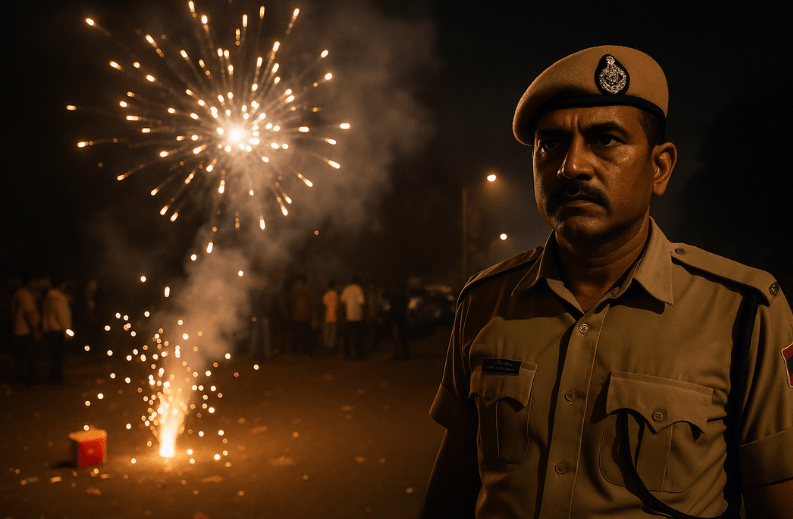During this year’s Diwali, Delhi police files over 175 FIRs for firecracker violations, showing strong dedication to enforcing Supreme Court orders. The police acted firmly against people who broke the timing rules for bursting green firecrackers. Their goal was to protect public safety and control pollution. FIRs came from 15 different police districts, proving the city-wide effort to maintain order during celebrations.
The Supreme Court had announced strict time slots to limit pollution during Diwali. People could burst green firecrackers only from 6 am to 7 am and 8 pm to 10 pm on October 20 and on Diwali day. These rules aimed to reduce air and noise pollution, especially in Delhi, where pollution levels rise sharply during the festival season.
However, many residents ignored the order. According to police data, East, South, and Dwarka districts recorded the most cases. The East district led with 25 FIRs, followed by Dwarka with 21 and South with 20. This pattern showed that violations were more frequent in specific zones.
Here is a district-wise list of FIRs filed during Diwali:
- East: 25
- Dwarka: 21
- South: 20
- Outer: 18
- Shahdara: 16
- Northeast: 14
- Northwest: 13
- New Delhi: 11
- North: 11
- Outer North: 7
- Southwest: 6
- West: 6
- Rohini: 3
- Central: 3
- Southeast: 1
In New Delhi’s Lutyens zone, which covers areas like Chanakyapuri and Mandir Marg, officers filed 11 FIRs. In contrast, the Southeast district, which includes Defence Colony and Greater Kailash, saw only one FIR, showing better rule-following in that region.
Police booked offenders under Sections 223(a) and (b) of the Bharatiya Nyaya Sanhita, 2023, and the Explosives Act of 1884. These laws punish those who disturb public peace or risk others’ health. A person who causes inconvenience may face up to six months in jail or a fine of ₹2,500, while dangerous actions can lead to one year in jail or a ₹5,000 fine.
To stop violations, Delhi Police sent out special patrol teams and drones in sensitive zones. These teams, which included members from the Delhi Pollution Control Committee (DPCC) and local authorities, quickly identified offenders. They also seized several boxes of banned firecrackers during late-night checks.
Officials reminded citizens that only green firecrackers approved by the National Environmental Engineering Research Institute (NEERI) are allowed. Firecrackers with harmful chemicals such as barium remain banned. Still, after Diwali, the Air Quality Index (AQI) in Delhi rose sharply, reaching the “very poor” range.
Environmental experts said that while festivals often cause short-term pollution, consistent monitoring and community cooperation can help reduce long-term damage. They also stressed that public awareness plays a key role in promoting eco-friendly celebrations.
The Delhi administration and police plan to submit a detailed report to the Supreme Court on how the order was followed. The court will review the report after three weeks to ensure stronger compliance next time.
This proactive action by Delhi Police reflects rising concern for environmental protection. Citizens are urged to celebrate responsibly and think about public health. Delhi police files over 175 FIRs for firecracker violations, proving that awareness and discipline together can make festivals both joyful and sustainable.



